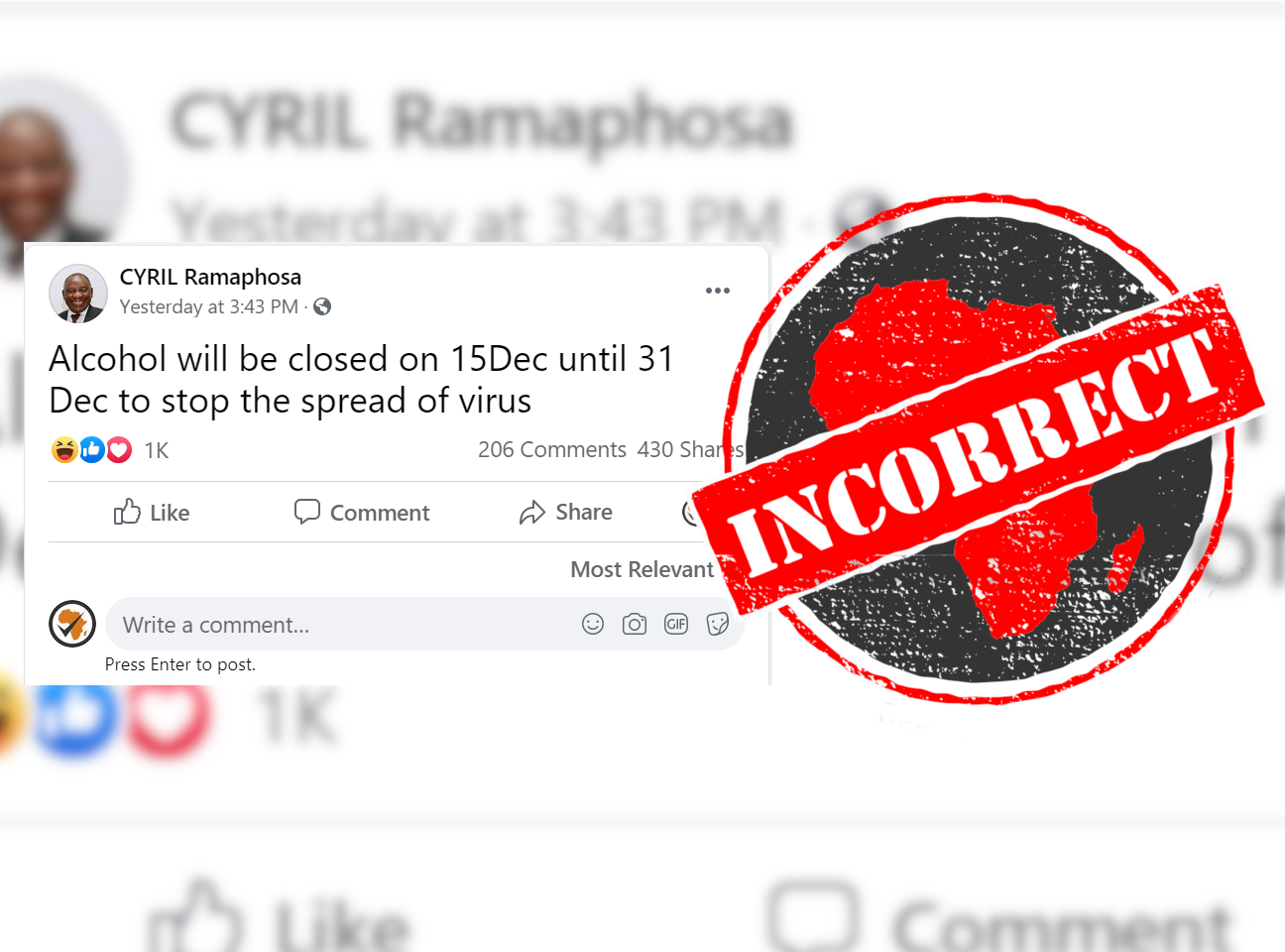A post circulating on Facebook claims that alcohol will be “closed” in South Africa between 15 and 31 December 2020 to “stop the spread of the virus”.
The South African government has previously placed restrictions on the sale of alcohol as part of the country’s Covid-19 lockdown. Are there plans to bring these restrictions back, just as many in the country will be going on holiday?

The 1 December post was shared to Facebook by a page called “CYRIL Ramaphosa”. Created in March 2020, the page has over 132,000 followers. It uses a photo of South African president Cyril Ramaphosa as a profile picture.
But the page has no links to the president’s official Facebook account which was created in March 2018 and features a blue tick – an indication of the page’s authenticity.
Ramaphosa was set to meet with the National Coronavirus Command Council (NCCC) and provincial premieres on 2 December 2020, following a meeting of the NCCC the day before.
A number of media outlets reported that the NCCC would recommend that alcohol sales be restricted to Monday to Thursday and banned in public areas. These measures would possibly only be implemented in Covid hotspots, including Nelson Mandela Bay and the Garden Route in the Eastern and Western Cape provinces.
But there have been no announcements from the presidency, the national health department or the minister of health on any changes to restrictions yet but the president is expected to make a national address on 3 December.
And Africa Check could find no credible news reports to support the claim that alcohol sales would be banned nationally between 15 and 31 December 2020. If the claim were true, it would have been announced by official government sources and widely reported on.
Before sharing information about Covid-19 restrictions, check whether it has been confirmed on government or major news websites. – Africa Check
The South African government has previously placed restrictions on the sale of alcohol as part of the country’s Covid-19 lockdown. Are there plans to bring these restrictions back, just as many in the country will be going on holiday?

No links to president’s official Facebook page
The 1 December post was shared to Facebook by a page called “CYRIL Ramaphosa”. Created in March 2020, the page has over 132,000 followers. It uses a photo of South African president Cyril Ramaphosa as a profile picture.
But the page has no links to the president’s official Facebook account which was created in March 2018 and features a blue tick – an indication of the page’s authenticity.
Possible alcohol restrictions ahead, but none announced yet
Ramaphosa was set to meet with the National Coronavirus Command Council (NCCC) and provincial premieres on 2 December 2020, following a meeting of the NCCC the day before.
A number of media outlets reported that the NCCC would recommend that alcohol sales be restricted to Monday to Thursday and banned in public areas. These measures would possibly only be implemented in Covid hotspots, including Nelson Mandela Bay and the Garden Route in the Eastern and Western Cape provinces.
But there have been no announcements from the presidency, the national health department or the minister of health on any changes to restrictions yet but the president is expected to make a national address on 3 December.
And Africa Check could find no credible news reports to support the claim that alcohol sales would be banned nationally between 15 and 31 December 2020. If the claim were true, it would have been announced by official government sources and widely reported on.
Before sharing information about Covid-19 restrictions, check whether it has been confirmed on government or major news websites. – Africa Check
Republish our content for free
For publishers: what to do if your post is rated false
A fact-checker has rated your Facebook or Instagram post as “false”, “altered”, “partly false” or “missing context”. This could have serious consequences. What do you do?
Click on our guide for the steps you should follow.
Publishers guideAfrica Check teams up with Facebook
Africa Check is a partner in Meta's third-party fact-checking programme to help stop the spread of false information on social media.
The content we rate as “false” will be downgraded on Facebook and Instagram. This means fewer people will see it.
You can also help identify false information on Facebook. This guide explains how.



Add new comment